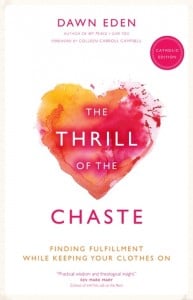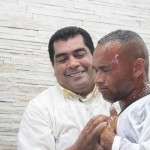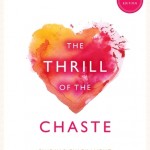 In this new Catholic edition of The Thrill of the Chaste, [Dawn] Eden is still living as a sign of contradiction — the world, after all, still misunderstands chastity as being little more than a dreary and joyless island of “no” — but she also has become a rather paradoxical witness to the world of “yes,” and how the power of that word, directed first to God, before any human, creates a chaste place for the Holy Spirit, and providence, to work in our lives.
In this new Catholic edition of The Thrill of the Chaste, [Dawn] Eden is still living as a sign of contradiction — the world, after all, still misunderstands chastity as being little more than a dreary and joyless island of “no” — but she also has become a rather paradoxical witness to the world of “yes,” and how the power of that word, directed first to God, before any human, creates a chaste place for the Holy Spirit, and providence, to work in our lives.
“If you take the longing you feel in your heart and direct it toward sharing agape love with those around you, then you will never again have to worry about the million things that could go wrong in a budding relationship. None of those things will matter, because you will have a divine spark in your heart that will outshine all the externals,” she writes.
“The spouse whom divine providence has in store for you will be drawn to that spark — and will carry that same spark within, for you will both draw light from the same source.”
As a married woman who is only now beginning to explore the meaning of agape, and what is contained within the depths and breadth of the word, “The Thrill of the Chaste” has proved itself an invaluable tool. As I ponder how our society is presenting us with one previously unimaginable “new normal” after another — encountered at work, in our families and in the pews we share for worship — it strikes me that Eden’s words on agape-led virtue may point us toward the best way to evangelize the missionary landscapes all of our lives have become.
That’s because The Thrill of the Chaste is about how doing the right thing, the God-affirming thing, becomes the daringly optimistic thing, because it draws you continually toward meeting God in the midst of daily mystery — of all we do not understand in the midst of our sound certainties.
Eden’s book testifies that answering the ever-affirming “yes” of God with a “yes” of one’s own is the key to discovering a simple reality: that we are not meant to meander but to travel a river of love, and God is its source.
To consent to ride within its purity — amid rocks and bends, shallows and tumbling falls, and all — is to learn to trust.
When we can finally trust, there is no risk, then, in reaching out to others who are hanging back, standing at the edge of salvation, fearfully clinging to the world and all it calls “good” and “safe.” Reaching out in agape-led virtue, undertaking the missionary’s role of bringing light to the dark places, that is truly the thrill of the chaste.
















